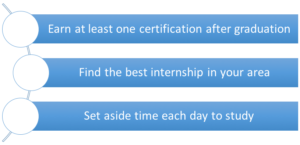 If you have a passion for promoting health and wellness, a career in health education could be right for you. Health educators work directly with the community to prevent disease and prolong lifespan. They aim to develop programs to encourage a healthy lifestyle and spread awareness of common health issues.
If you have a passion for promoting health and wellness, a career in health education could be right for you. Health educators work directly with the community to prevent disease and prolong lifespan. They aim to develop programs to encourage a healthy lifestyle and spread awareness of common health issues.
As a health educator, you’ll have the opportunity to work with people of all ages in:
- Elementary and secondary schools
- Colleges
- Hospitals and other healthcare facilities
- Non-profit organizations
- Private companies
- Government agencies
According to the Bureau of Labor Statistics, overall employment of health educators is expected to grow 11% by 2028. This rapidly-growing field is an excellent choice for anyone who wants to make a real difference in their community while earning a competitive salary.
Is an online health education degree a good investment?
For a successful career in health education, a college degree is a must. Some certifications, such as the Certified Health Education Specialist (CHES), may be required as well. Since the health education field is growing so rapidly, there are many high-quality degree programs available. And even if your schedule is too busy to attend classes on-campus, you’ll be able to earn your degree online.
By pursuing your online degree in health education, you’ll be able to make a difference in countless lives, including your own. Whether you’re interested in a bachelor’s or an associate’s degree, there are many exciting programs to choose from. But before you settle on a program, it’s important to understand the pros and cons of online learning.
What are the benefits of an online health education degree?
According to recent statistics from Babson College, the popularity of distance learning is growing by the year. Your online degree program will connect you with other students around the country who have a passion for health and wellness.
Here are some pros of an online health education degree:
- You’ll be prepared for a career dealing with the public: As a health educator, good communication skills are essential. Since educating the community will be such a huge part of your job, employers will expect you to have experience with a broad range of people. In your online classes, you’ll meet students from across the country without being limited to your own geographical area. Since health educators frequently deal with people of all ages, ethnic groups, and income levels, this is a huge advantage.
- Your writing skills will improve: In your online classes, you’ll get used to talking with your professors and fellow students through text. Regularly participating in discussion forums will prepare you to communicate clearly and effectively. This will be a huge advantage when it’s time to write community health plans or propose new programs. In a field that’s so dependent on grants and government funding, employers will be sure to appreciate your ability to sway others through writing.
- The future of health education is digital: Like many other fields, health education is becoming more computer-based with each passing year. Health educators often reach out to the community through online platforms, social media, and company websites. Employers understand how important it is for educators to connect with people in the digital world, so your online degree will make you stand out from other candidates.
- You’ll be able to work on your own schedule: It’s difficult to balance on-campus classes with a full time job or a family to take care of. Online learning is a great way to prepare for a career in health education while keeping time for all your other commitments.
What are the disadvantages of an online health education degree?
Although online learning has improved the lives of many people, it’s not right for everyone. An on-campus program may be a better choice for your own personal career goals.
Here are some disadvantages of an online health education degree:
- You may miss out on practical experience: One of the biggest drawbacks to online education is that you won’t have access to the labs and other facilities that on-campus students can enjoy. In health education, this isn’t as much of an issue as it may be in other fields such as engineering or biology. However, you could still miss out on opportunities to see face-to-face demonstrations and work alongside your instructors at community events.
- As an online student, it may be more difficult to find an internship: Internships are an important part of the college experience for many majors, including health education. On-campus students often have the opportunity to intern at hospitals, government offices, or even on campus. However, finding an internship is a challenge for many online students. When you’re searching for a job, employers may hold it against you if you don’t have any first hand experience: So if you plan on earning your degree online, be prepared to search far and wide for internship opportunities in your area.
- You may regret not being able to attend on-campus events: In an online program, you’ll also miss out on the opportunity to join clubs and take part in extracurricular activities. Since working with the community is such an important part of health education, you may regret not being able to participate in these events with your fellow students.
How will employers view my online health education degree?
Since health education isn’t as “hands-on” as some majors, the curriculum translates very well to an online program. As long as you go the extra mile to find an internship in your area, employers should view your online health education degree the same way as an on-campus one.
When choosing a health education program, the most important thing you can do is make sure your degree is from a reputable school. Keep in mind that schools with trusted on-campus locations, such as Southern New Hampshire University or Kent State University, are much more likely to earn respect from potential employers than “online only” schools.
Here are some tips for impressing employers with your online degree.
If you want to be sure that employers value your credentials as much as a traditional degree, follow these tips:
- Consider earning certifications to supplement your degree: Passing exams such as the NCHEC will broaden your job prospects and make you stand out from other job-seekers.
- Go out of your way to find an internship: Ideally, you’ll be able to graduate from your online health education program with at least one internship. The hands-on experience will impress employers and make them trust in your ability to educate the community.
- Set aside time to study every day: Keeping up with homework and discussion posts is essential for success in online classes. Be sure to complete all your reading assignments ahead of schedule as well.
Erica Ciko Campbell
Bachelor of Science (B.S.), Biology| Utica College
Associate of Science (A.S.)| Herkimer County Community College
October 2019
More Articles of Interest:

